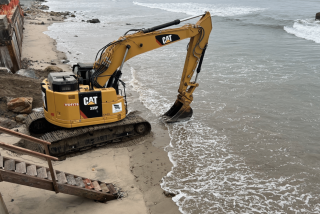Court Ruling Jeopardizes Coastal Panel
A state appeals court in Sacramento on Monday ruled that the California Coastal Commission violates the state Constitution by allowing the Legislature broad authority to appoint and remove a majority of the commissioners, who wield executive powers.
Attorneys for the commission immediately began devising strategies for suspending the court’s order, pending a certain appeal to the state Supreme Court. Otherwise, the order from the 3rd District Court of Appeal will in effect shut down the commission’s power to regulate development along the state’s 1,150-mile coastline and throw thousands of pending building permits into limbo. The ruling will take effect in 30 days.
“Clearly, if the order were to take effect immediately, that would mean chaos,” said Peter Douglas, the commission’s executive director. “The commission wouldn’t be able to function. We would have to cancel our meetings because the commission couldn’t make any decisions.”
The commission also would be unable to weigh in on federal proposals, such as the Bush administration’s push for more oil drilling in the Santa Barbara Channel, and to determine if such plans comply with state environmental protection laws.
“It’s a tremendous day for us,” said Ronald Zumbrun, a property rights lawyer who has raised constitutional arguments in this case and other lawsuits against the commission for more than a dozen years. “We finally found a trial judge who agreed with our kooky ideas, and this Court of Appeal’s ruling certainly gives the case credibility that the Coastal Commission has to pay attention to.”
The three-justice panel agreed unanimously to uphold a lower court’s ruling that the commission violates the state Constitution’s separation-of-powers doctrine. The Legislature controls the positions of eight of the 12 members of the commission, which operates within the executive branch. The governor appoints the other four.
The 20-page ruling focused specifically on one aspect of the law: that the Assembly speaker and Senate Rules Committee not only have the power to appoint a majority but, more important, have the authority to remove those commissioners “at will.”
“The flaw is that the unfettered power to remove the majority of the commission’s voting members and to replace them with others ... makes them subservient to the Legislature,” the ruling said.
“In a practical sense,” the justices wrote, “this unrestrained power to replace a majority of the commission’s voting members, and the presumed desire of those members to avoid being removed from their positions, allows the legislative branch not only to declare the law but also to control the commission’s execution of the law and exercise of its quasi-judicial powers.”
Gerald Uelmen, who follows the state Supreme Court from his post at Santa Clara University’s law school, predicted that the state’s highest court will take the case on appeal. “I don’t think this is the final word on the matter, he said. “I cannot imagine the Supreme Court will leave it up to the Court of Appeal to invalidate the entire Coastal Commission.”
Stephen R. Barnett, a state constitutional expert at UC Berkeley’s Boalt Hall School of Law, who had predicted the appeals court’s conclusion, expects that it will be upheld by the state Supreme Court.
But Barnett said he was surprised that the Court of Appeal did not simply strike the provision in the state Coastal Act that permits lawmakers to withdraw coastal commissioners at will, rather than issue a ruling that jeopardizes the future of the commission.
In the ruling, the justices italicized the words “may be removed at the pleasure of the legislative branch,” he said. “They almost invite the Legislature to lop off that language. What surprises me is that they didn’t do it themselves by lopping off the provision in the statute.”
Barnett said the Supreme Court could take that step. He pointed out that the high court also faces a thorny issue that was sidestepped by the Court of Appeal: Will ruling the commission unconstitutional be retroactive, thus undoing more than 100,000 building permits granted or denied by the commission in the last 27 years?
“While Zumbrun and his friends will argue strenuously that the decision would be retroactive, I doubt they will be,” Barnett said. “As a practical matter, those permits will not be undone. A lot of parties have relied on those decisions and made substantial investments. It would be legal chaos to undo them.”
Zumbrun, co-founder of the conservative Pacific Legal Foundation, said he has raised the same separation-of-powers arguments in lawsuits over the years against the commission.
This time, he presented them as part of a lawsuit he filed on behalf of the Marine Forests Society, a nonprofit group that built an artificial reef of old tires, plastic jugs and PVC pipe off the coast of Newport Beach without getting the required permit from the Coastal Commission.
The Coastal Commission, which took a dim view of building a reef with discarded tires and other “trash,” issued a “cease and desist” order for removal of the reef. Zumbrun argued in the case that the commission cannot issue such an order because its makeup is an unconstitutional intrusion by the Legislature into the executive branch.
The argument was embraced in April 2001 by Sacramento County Superior Court Judge Charles C. Kobayashi, an appointee of then-Gov. George Deukmejian, who sought during the 1980s to dismantle the commission.
Kobayashi’s order was upheld Monday by appeal court Justices Arthur G. Scotland and Rodney Davis, both Deukmejian appointees, and by Justice Ronald B. Robie, recently appointed to the appeals court by Gov. Gray Davis.
In targeting the makeup of the commission, the ruling turns what had been thought to be the agency’s strength into its Achilles heel. The architects of the commission sought to make it independent of political pressure by dividing the powers to appoint commissioners among the governor, the Assembly speaker and the Senate Rules Committee.
The commission’s independence has infuriated a succession of governors as they found that they could not control an agency that belongs to the executive branch. Even former Gov. Edmund G. “Jerry” Brown Jr., an early champion of the Coastal Commission, grew angry when he could not intervene on behalf of this then-girlfriend, singer Linda Ronstadt, who wanted to build a seawall next to her Malibu Colony home.
Davis was cautious in his appraisal of the ruling, saying through a spokesman that the commission must decide for itself what is the best next step. “Gov. Davis recognizes that the Coastal Commission is an independent body,” said Bryon Tucker, an aide. “It provides a valuable function in safeguarding our coast.”
During its monthly meetings, the commission acts like a planning commission responsible for development decisions along the entire coast. It routinely determines the fate of building permits for oceanfront homeowners and real estate developers who often have better luck gaining the assent of local planning commissions. But many applicants have found it difficult to win over a majority of coastal commissioners for projects that conflict with protections outlined in the 1976 Coastal Act.
Zumbrun, the building and real estate industries, the state Farm Bureau and property rights advocates have long argued that the commission has trampled on the rights of landowners and is accountable to no one.
If the ruling stands, Zumbrun said he believes that such building permits would be handled the way they were before the enactment of the Coastal Act -- by city councils or by county boards of supervisors.
Critics of the old system argue that it resulted in unchecked growth along the coast and prompted the voters in 1972 to approve Proposition 20, the ballot initiative that first established the coastal protections that the commission is supposed to enforce.
Mark Massara, manager of the Sierra Club’s coastal programs, said he expects the Legislature to fix the constitutional problem by forfeiting their power to remove commissioners at will.
“I think the Legislature will provide for fixed terms,” Massara said.
“This case, ironically, could have the effect of making the Coastal Commission more independent, and that was certainly not the goal of Ronald Zumbrun,” he said.
Coastal Commission Chairman Mike Reilly said the commissioners would consider all of their legal options at their meeting in Los Angeles, scheduled for next week.
More to Read
Sign up for Essential California
The most important California stories and recommendations in your inbox every morning.
You may occasionally receive promotional content from the Los Angeles Times.










